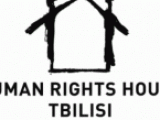Հարավկովկասյան Իրավապաշտպանների ցանցը
A critical voice about elections imprisoned in Azerbaijan

[03.11.2014]
The Human Rights House Network is calling upon the CoE parliamentary assembly to join our call to release Anar Mammadli immediately and unconditionally. Anar Mammadli, Chairman of the Azerbaijani Election Monitoring and Democracy Studies Centre (EMDS) documented electoral irregularities during the presidential elections of October 9, 2013 in Azerbaijan. He was detained on 16 December 2013. The criminal case was opened with tax evasion, illegal business activity, and abuse of authority. Anar Mammadli was not supposed to be imprisoned; the aim of his work is to monitor elections, advocate for inclusive electoral laws allowing real participation of all citizens in his country. Leaders of his country obviously dislike this.
In Azerbaijan indeed the presidential election of October 2013 was a well orchestrated show of the ruling man – and his family, not a demonstration of the fulfilment of principles and norms of international law, such as the guarantee that every citizen has the right and the opportunity to take part in the conduct of public affairs, including through freely chosen representatives. The president of the Republic of Azerbaijan should potentially be one of those freely chosen representatives.
In January 2013, the single largest parliamentary body of Europe, assembling legislative members from 47 European States, assessed that “not a single parliamentary or presidential election has fully met democratic standards” in Azerbaijan. The 2013 election was no different. The election observation mission of the Organisation for Security and Cooperation in Europe (OSCE) not only noted the election was seriously flawed, it even allowed itself an unusual assessment in diplomatic spheres by stating that “citizens of Azerbaijan deserve better.”
Parliamentarians of the Council of Europe were sent to Baku for the Election Day. Those parliamentarians however qualified the election as “free, fair and transparent.” They added that it was marked by “sound technical preparations.” Some will for long remember the so-called “AppGate” as one of the technical improvements; the national electoral commission indeed announced, on a smartphone app created for the occasion, the victory and re-election of President Ilham Aliyev, one day ahead of the election.
National election observers, especially the Election Monitoring and Democracy Studies Centre (EMDS) led by Anar Mammadli, quickly denounced the assessment of those parliamentarians.
EMDS is a non-partisan Azerbaijani election monitoring group, recognised for its professional work and the credibility of its findings. It has never been allowed to register in Azerbaijan and previously, the NGO called Election Monitoring Centre also led by Anar Mammadli has lost been unregistered by the authorities. EMDS’ found that violations occurred in 91 per cent of the polling stations it observed on Election Day for the presidential election. Observations were collected by text messages sent by the 769 independent and trained observers based in all 125 constituencies of the country. This represents about 15 per cent of all polling stations. Violations include multiple voting with buses bringing voters from one station to another, ballot filling or obvious disturbance and harassment of election observers. EMDS further documented pressure ahead of elections, including limitation of fundamental rights as a general system to control the country and public expression, limiting access for opposition and critical voices in civil society to media and pressuring, harassing and punishing independent media and journalists. Opposition movements were also harassed and well-known candidates prevented from being able to be on the ballot. Ilgar Mammadov, the first united opposition candidate, was arrested on 4 February 2013, accused at the time of inciting riots. The second choice of the united opposition, 1994 Academy Award winner for the film “Burnt by the Sun” Rustam Ibragimbekov, was refused registration to be on the ballot due to inter alia his so-called “commitment to the Russian Federation.”
By calling the election “fair, free and transparent,” politicians should indeed feel ashamed of lowering the electoral standards in Europe. The Parliamentary Assembly of the Council of Europe meeting this month for its first session following the presidential election in Azerbaijan needs to rebuild its credibility on election monitoring. It also needs to hold member States accountable to European human rights law, said as being the strongest protection system in the world, or we will begin to question whether the assembly is becoming a “club of friends” of autocracies instead of the itching powder it used to be. The parliamentarians used to challenge the strongest powers in Europe whether they had gold or weapons, by upholding rights and principles. Whilst the Parliamentary Assembly is meeting in Strasbourg, we will be calling upon the Georgian delegation led by Tedo Japaridze to join our call to release Anar Mammadli immediately and unconditionally, because the right to assemble in order to observe elections is at the core of any democratic society, of any European country.
Author signing as HRHN member in Georgia and translation in Georgian - Nino Tlashadze from the Human Rights Centre. The Human Rights House Network (HRHN) unites 87 human rights NGOs joining forces in independent Human Rights Houses in 16 countries in Western Balkans, Eastern Europe and South Caucasus, East and Horn of Africa, and Western Europe. HRHN’s aim is to protect, empower and support human rights organizations locally and unite them in an international network of Human Rights Houses.
Օրացույց
Արխիվ
|
||||||||||||||||||||||||||||||||||||||||||
|

